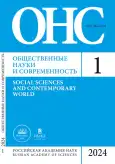Transnational business in conditions of geoeconomic fragmentation
- 作者: Kislitsyn S.V.1, Guzheva A.A.1
-
隶属关系:
- Primakov National Research Institute of World Economy and International Relations of the Russian Academy of Sciences
- 期: 编号 1 (2024)
- 页面: 60-73
- 栏目: World economy
- URL: https://journals.eco-vector.com/0869-0499/article/view/676304
- DOI: https://doi.org/10.31857/S0869049924010055
- EDN: https://elibrary.ru/RSAVIS
- ID: 676304
如何引用文章
详细
The formation of a polycentric system of international relations leads to geoeconomic fragmentation of international trade. Interstate contradictions create specific risks for multinational companies (MNCs). As a result of the emergence of a “new” world order, transnational corporations face risks of disruption of global supply chains, strengthening of protectionist policies, introduction of inconsistent standards that are incompatible with each other and dissemination of non-market restrictions in the field of investment, technology and access to foreign markets. The impact of modern international contradictions on the strategic approaches of MNCs is analyzed. General aspects of the fragmentation in the world economy and its likely limits are examined. International economic challenges for business are studied, as well as political and reputational risks (based on the example of the Russian Federation). It is concluded that the corporate sector has to take certain political positions due to interstate conflicts. Consequently, a new non-economic factor influencing transnational companies’ strategic management is identified.
全文:
作者简介
Sergey Kislitsyn
Primakov National Research Institute of World Economy and International Relations of the Russian Academy of Sciences
编辑信件的主要联系方式.
Email: skislitsyn@imemo.ru
ORCID iD: 0000-0002-8438-7964
Candidate of Political Science, Head of the Centre for Strategic Planning Studies
俄罗斯联邦, 23, Profsoyuznaya Street, Moscow, 117997Anna Guzheva
Primakov National Research Institute of World Economy and International Relations of the Russian Academy of Sciences
Email: aguzheva@imemo.ru
ORCID iD: 0000-0003-2747-6837
Senior Laboratory Assistant-Research Fellow, Center for Strategic Planning Studies
俄罗斯联邦, 23, Profsoyuznaya Street, Moscow, 117997参考
- Bereznoi A. (2018) Transnacional’nyj biznes v epohu global’noj cifrovoj revolyucii [Multinational Business in the Era of Global Digital Revolution]. Mirovaya ekonomika i mezhdunarodnye otnosheniia. vol. 62, no 9, pp. 5–17. doi: 10.20542/0131-2227-2018-62-9-5-17 (In Russ.).
- Dmitriev S. (2023) Amerikanskij «cifrovoj zanaves» dlya izolyacii Kitaya [American «Digital Curtain» to Isolate China]. Mirovaya ekonomika i mezhdunarodnye otnosheniia. vol. 67, no. 7, pp. 44–53. doi: 10.20542/0131-2227-2023-67-7-44-53 (In Russ.).
- Kuznetsov A. (2022) Fenomen pryamyh investicij, ne svyazannyh s «klassicheskimi» TNK [Phenomenon of Direct Investments that are Not Associated with «Classic» TNCs]. Mirovaya ekonomika i mezhdunarodnye otnosheniia. vol. 66, no. 1, pp. 91–99. doi: 10.20542/0131-2227-2022-66-1-91-99 (In Russ.).
- Milovidov V., Asker-Zade N. (2020) Protekcionizm 2.0: novaya real’nost’ epohi globalizacii [Protectionism 2.0: New Reality in the Age of Globalisation]. Mirovaya ekonomika i mezhdunarodnye otnosheniia. vol. 64, no 8, pp. 37–45. doi: 10.20542/0131-2227-2020-64-8-37-45 (In Russ).
- Kirillov V.N., Smirnov E.N. (2019) Traektoriya ustojchivogo rosta ili ocherednaya razbalansirovka mekhanizmov mirovoj ekonomiki [Trajectory of Steady Growth or Next Disbalance of Mechanisms of the World Economy]. Vestnik MGIMO Universiteta. no 5, pp. 64–90. doi: 10.24833/2071-8160-2019-5-68-64-90 (In Russ.).
- Chudinova K.O. (2022) Vliyanie tekhnologicheskoi konkurentsii s Kitaem na kharakter amerikanoyaponskogo torgovogo vzaimodeistviya [The Impact of Technological Competition with China on the Nature of American Japanese Trade Interaction]. Obshchestvennye nauki i sovremennost’. no. 4. pp. 118–131. doi: 10.31857/S0869049922040098 (In Russ.).
- Aiyar S., Chen J., Ebeke C., Garcia-Saltos R., Gudmundsson T., Ilyina A., Kangur A., Rodriguez S., Ruta M., Schulze T., Trevino J., Kunaratskul T., Soderberg G. (2023) Geoeconomic Fragmentation and the Future of Multilateralism. IMF Staff Discussion Note, SDN/2023/01, Washington, DC: International Monetary Fund. 38 p.
- Butollo F. (2021) Digitalization and the Geographies of Production: Towards Reshoring or Global Fragmentation? // Competition & Change. Vol. 25. Issue 2. Pp. 259–278. doi: 10.1177/1024529420918160 P. 266–270
- Brakman S., Garretsen H., Van Witteloostuijn A. (2020) The Turn from Just-in-Time to Just-in-Case Globalization in and after Times of COVID-19: An Essay on the Risk Re-appraisal of Borders and Buffers // Social Sciences & Humanities Open. No. 2.
- Enderwick P., Buckley P. (2020) Rising Regionalization: Will the Post-COVID-19 World See a Retreat from Globalization? // Transnational Corporations. Vol. 27. No. 2. Pp. 99–112.
- Intscher N. (2020) The Fragmentation of Political Risk and MNCs’ Supply Chain Linkages. Massachusetts Institute of Technology. 279 p.
- Kamal F., McCloskey J., Ouyang W. (2022) Multinational Firms in the US Economy: Insights from Newly Integrated Microdata. US Census Bureau Center for Economic Studies Working Paper. Pp. 22–39.
- Sonnenfeld J. Tian S., Zaslavsky S., Bhansali Y., Vakil R. (2022) It Pays for Companies To Leave Russia. doi: 10.2139/ssrn.4112885
- Yonson R., Noy I. (2018) Economic Vulnerability and Resilience to Natural Hazards: Concepts and Measurements // Sustainability. No. 10. Pp. 2850. doi: 10.3390/su10082850










